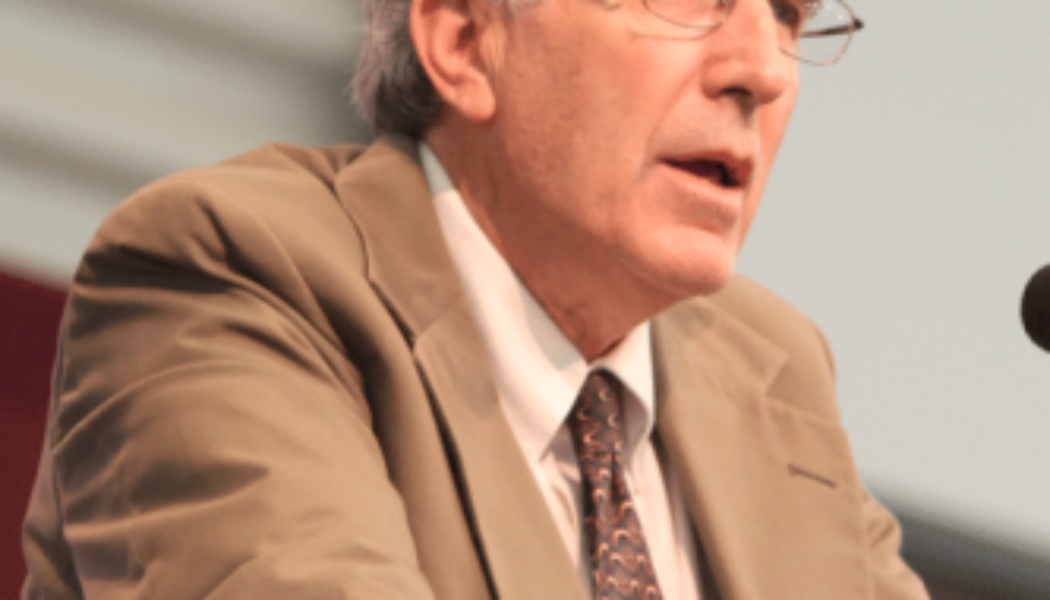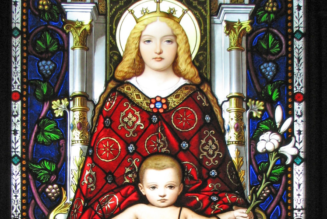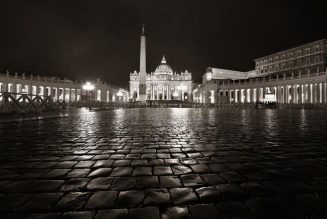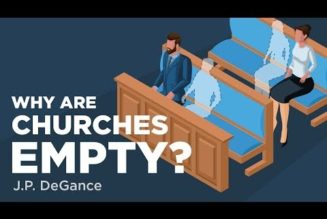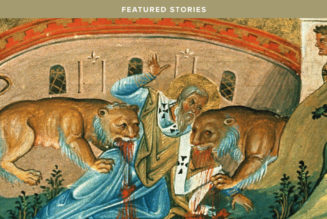Will the defense of marriage be the hill on which we Catholics die? Of course, that rather depends on how willing we are to stake everything upon a truth that, however much we believe it to be grounded in divine revelation, is nevertheless rejected by almost everyone else, including great numbers of our fellow Catholics.
Which would be Joe Biden Catholics, wouldn’t it? Countless cafeteria Catholics, as it were, whose numbers, to judge by current approval ratings, appear to be legion. Are we prepared to stand against these people for the sake of a mere marital bond? Do we really believe, in other words, the teaching of the Catholic Church concerning the union of one man and one woman? That it constitutes a sacrament indissoluble in the sight of God? And will we, in mounting its defense, be forced to go all the way to the Cross?
If so, we should find ourselves in some pretty good company. Historically speaking, that is. We’d be surrounded and sustained by a great and mighty cloud of witnesses. Will that consolation, I wonder, be enough to steel the nerve in the face of the world’s rejection?
Orthodox. Faithful. Free.
Sign up to get Crisis articles delivered to your inbox daily
form.fluent_form_4 .ff-t-cell {padding: 0px;}
form.fluent_form_4 .ff-t-cell:last-of-type {width: 60%;}
form.fluent_form_4 .ff-el-form-control {padding: 18px 16px 19px!important; border-radius: 2px 0 0 2px!important;}
form.fluent_form_4 .wpf_has_custom_css.ff-btn-submit {border-radius: 0 2px 2px 0;}
} .fluentform_wrapper_4{ margin: px; } .fluentform_wrapper_4{ padding: px; } .fluentform_wrapper_4 .ff-el-group.ff_submit_btn_wrapper { text-align: center; }.fluentform_wrapper_4 .ff_submit_btn_wrapper .ff-btn-submit { background-color: rgba(0, 68, 177, 1);padding-top: 20px;padding-left: 10px;padding-right: 10px;padding-bottom: 20px; }.fluentform_wrapper_4 .ff_submit_btn_wrapper .ff-btn-submit:hover { background-color: rgba(253, 159, 1, 1); }
Once upon a time, not so very long ago, that was the hill on which not a few of our co-religionists were willing to die. It’s a toss-up whether it still functions that way for us today. For our ancestors in the faith, it was either apostasy or death, with no middle ground in between. One thinks of Sir Thomas More, for example, the brave and resolute Lord Chancellor of England, whose defiance of his King, Henry Tudor, and the entire corrupt establishment suborned into doing his bidding, cost him his head.
Indeed, not only were More and others like him willing to lose their heads in defense of the integrity of Christian marriage. The Church herself, including especially the Holy Father, was prepared to lose half of Europe on account of an adamantine refusal to gratify the greed and lust of one English monarch. How disproportionate the Pope’s gesture must appear to today’s Catholics, whose attitudes have been shaped less by the catechism than the culture.
Of course, if you regard Rome as having been historically retrograde on the matter, imagine the salutary shock you’ll get when the example of Israel comes up, most particularly in the person of John the Baptist, her greatest prophet. How tolerant of divorce was he? Didn’t he get himself thrown into prison, followed a year or so later by execution, all because of a rebuke delivered to Herod Antipas, Ruler of Galilee? What exactly had Herod done to warrant so stinging a rebuke? Divorcing one wife in order to marry another, who had likewise divorced her husband. Sounds like one of the afternoon soaps, doesn’t it?
Defending marriage these days would seem to be a hill, therefore, on which not so many are prepared to die. But why should that be the case? After all, there really isn’t anything more deserving of defense than the oldest institution in the world, one which God himself invented, inserting it first into the order of nature, followed by its elevation into the order of grace. What else have we got going for us if not a God entirely on the side of love? Has he not gone so far as to identify himself as love? “God’s eros,” Pope Benedict reminded us, “is not only a primordial cosmic force, it is the love that has created man and that bends before him, as the Good Samaritan bent before the wounded man, victim of thieves, who was lying on the side of the road.”
If that’s the energy source upon which human love depends, why wouldn’t everyone wish to plug in? Which is permanent—indissolubly true and binding—or it isn’t at all. Besides, what else is there? “God is the absolute and ultimate source of all being,” Benedict wrote, “but this universal principle of creation—the Logos, primordial reason—is at the same time a lover with all the passion of a true love.” What more could human love ask for? It is nothing less than life with God, who is himself pure unchanging eternal love. Is it not here that we see the outline of ultimate reality, that behind all the appearances we find the real meaning of being, and his name is Jesus? Who is, to quote the final line of The Paradiso, “l’amor che move il sole e l’altre stelle”—”the love that moves the sun and the other stars.”
That is the force that will move the hearts of men and women joined to one another in holy matrimony. What lover would not wish for a fulfillment along those lines, the very lines of divine love itself?
And what could be more natural, or necessary, to the maintenance of a functioning society than the fidelity which marks relations between married men and women? Who, quite literally, find themselves in love? For a society to insist that they honor the promises they first made to each other is not tyranny, therefore, but truth telling. body .novashare-ctt{display:block;position:relative;background:#fd9f01;margin:30px auto;padding:20px 20px 20px 15px;color:#fff;text-decoration:none!important;box-shadow:none!important;-webkit-box-shadow:none!important;-moz-box-shadow:none!important;border:none;border-left:5px solid #fd9f01}body .novashare-ctt:hover{color:#fff}body .novashare-ctt:visited{color:#fff}body .novashare-ctt *{pointer-events:none}body .novashare-ctt .novashare-ctt-tweet{display:block;font-size:18px;line-height:27px;margin-bottom:10px}body .novashare-ctt .novashare-ctt-cta-container{display:block;overflow:hidden}body .novashare-ctt .novashare-ctt-cta{float:right}body .novashare-ctt.novashare-ctt-cta-left .novashare-ctt-cta{float:left}body .novashare-ctt .novashare-ctt-cta-text{font-size:16px;line-height:16px;vertical-align:middle}body .novashare-ctt .novashare-ctt-cta-icon{margin-left:10px;display:inline-block;vertical-align:middle}body .novashare-ctt .novashare-ctt-cta-icon svg{vertical-align:middle;height:18px}body .novashare-ctt.novashare-ctt-simple{background:0 0;padding:10px 0 10px 20px;color:inherit}body .novashare-ctt.novashare-ctt-simple-alt{background:#f9f9f9;padding:20px;color:#404040}body .novashare-ctt:hover::before{content:”;position:absolute;top:0px;bottom:0px;left:-5px;width:5px;background:rgba(0,0,0,0.25);}body .novashare-ctt.novashare-ctt-simple .novashare-ctt-cta,body .novashare-ctt.novashare-ctt-simple-alt .novashare-ctt-cta{color:#fd9f01}body .novashare-ctt.novashare-ctt-simple-alt:hover .novashare-ctt-cta,body .novashare-ctt.novashare-ctt-simple:hover .novashare-ctt-cta{filter:brightness(75%)}
What Chesterton has called “the ideal of constancy,” is not some sort of “yoke mysteriously imposed on mankind by the devil.” It is rather, as all true lovers will be the first to admit, “a yoke consistently imposed by all lovers on themselves.” The enemies of true love, he tells us,
have invented a phrase, a phrase that is a black and white contradiction in two words—‘free love’—as if a lover ever had been, or ever could be, free. It is the nature of love to bind itself, and the institution of marriage merely paid the average man the compliment of taking him at his word. Modern sages offer to the lover, with an ill-flavored grin, the largest liberties and the fullest irresponsibility; but they do not respect him as the old Church respected him: they do not write his oath upon the heavens, as the record of his highest moment. They give him every liberty except the liberty to sell his liberty, which is the only one that he wants.
If sex is the catalyzing event between two people, the natural progression of which leads to the altar, why shouldn’t we all have a vested interest in seeing marriage survive? Which can only happen, of course, when it is seen and upheld by all as permanent, as nothing less than the record of their highest moment.
